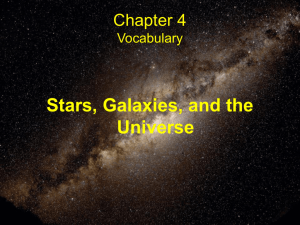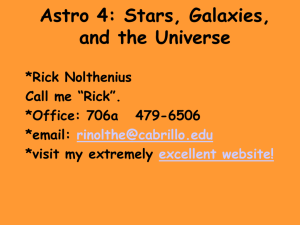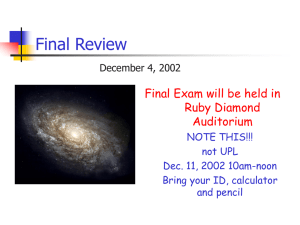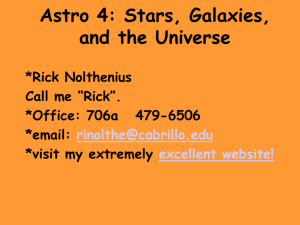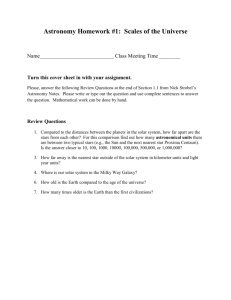Announcements
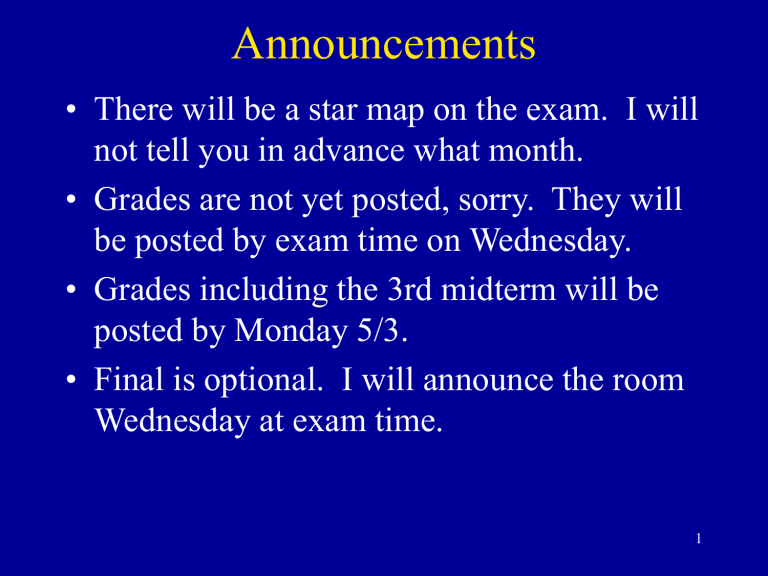
Announcements
• There will be a star map on the exam. I will not tell you in advance what month.
• Grades are not yet posted, sorry. They will be posted by exam time on Wednesday.
• Grades including the 3rd midterm will be posted by Monday 5/3.
• Final is optional. I will announce the room
Wednesday at exam time.
1
Life History of a Star
Loss of Energy to Space
Gravitational Contraction of Core
Contraction is halted temporarily by nuclear fusion
Energy generation in core
2
BRIGHT
HOT
FAINT
COOL
HR
Diagram
3
Star Birth
4
5
Small
Mass
Stars become
RED
GIANTS
6
Large
Mass
Stars become
RED
GIANTS
7
8
9
Small mass stars can not get hot enough to fuse Carbon
10
11
12
White Dwarfs & Neutron Stars
• White Dwarfs
– Supported by pressure of degenerate electrons
– About the size of the Earth
– Mass < 1.4 Msun
• Neutron Stars
– Supported by pressure of degenerate neutrons
– About the size of Lansing
– Mass < 3 Msun
13
Degenerate Pressure
• Pressure due to motion caused by squeezing particles very close together
Depends only on density, not on temperature
• Uncertainty Principle
location x
speed ~ h/mass
Means uncertainty in h is a small constant number
14
Formation of Black Holes
If the collapsing core of a massive star which produces the supernova explosion has more mass than the pressure of degenerate neutrons can support (> 3 M sun
)
Nothing can stop its collapse
The escape velocity reaches the speed of light
Nothing can go faster than the speed of light
Black Hole
15
Surface of a Black Hole
• Surface where escape velocity = speed of light is surface of a Black Hole, called Event Horizon
• Outside Event Horizon can escape, inside can not
16
If nothing can escape from a BH,
How do we know its there?
If gas falls into a BH
BH gravity makes it speed up
Conservation of Angular Momentum makes it form an Accretion Disk, orbiting at nearly the speed of light
Friction makes it very hot
Emits X-Rays
17
What can we know about Black Holes?
• Nothing can escape from inside an Event
Horizon
• Long range forces can exert influence outside Event Horizon:
1. Gravity
2. Electric Force
• Can know:
1. Mass
2. Charge
3. Spin
18
HR Diagram for brightest northern hemisphere stars
19
Test:
Cluster
HR
Diagrams
Same Distance
Same Age
20
HR
Diagram for clusters of different ages
21
Gas - Star - Gas Cycle
Return of gas enriched in heavy atoms
SN fuse atoms
> iron
SN or
Wind
Interstellar Gas
H, He, C, N, O, Fe, etc.
Fusion of
He, C, N, O
& heavier atoms
Gas cloud contracts
Star
22
Halo Stars:
0.02-0.2% heavy elements (O, Fe, …) only old stars
QuickTime™ and a
TIFF (Uncompressed) decompressor are needed to see this picture.
Disk Stars:
2% heavy elements stars of all ages
23
Milky
Way
Cartoon
24
Density Excess?
Higher density proto-galactic clouds form stars more rapidly, use up all their gas before it can form a disk.
25
Rotation?
Larger rotation produces more disk-like distribution of matter.
26
Galaxies are close together
Mergers may make Ellipticals
Burst of star formation
27
Elliptical galaxies are much more common in huge clusters of galaxies
1. Denser cloud
2. More collisions
(hundreds to thousands of galaxies)
28
Distance & Age
Here & Now space
Universe opaque
29
Fig 22.18
30
Relic Radiation
• Universe was once hot and opaque, see radiation from that time
(as from surface of a star)
– Comes at us from all directions
(inside fog bank)
– Has a thermal spectrum
– Cold now, expansion cools
31
Spectrum is Thermal, T=2.7 K
32
CMB Radiation
Radiation is nearly the same from all directions,
Doppler Shift due to motion of the Milky Way
T/T ~ 10 -3
After subtracting emission from MW, see
Primoridial fluctuations from when universe became transparent,
T/T ~ 10 -5
33
Relic
Elements
Theory
Observations
Universe is
75% H
25% He
Deuterium abundance constrains density of ordinary matter
34
What do we know about Dark Energy?
• Constitutes 2/3 of energy in universe
• Is smoothly distributed and invisible
Doesn’t clump into galaxies like
Matter, visible or dark
• Has negative pressure produces
Acceleration
35
Problems with the Big Bang Model
1. How can two pieces on opposites sides of the universe have the same temperature at the time the universe became transparent?
They are too far apart to have communicated with each other within the age of the universe, since light from them has just now reached us half way between.
36
Problems with the Big Bang Model
2. Why is the space-time geometry of the universe so nearly flat, equivalent to the sum of the Ordinary Matter, Dark Matter and Dark Energy = Critical Density?
37
Inflation
At very beginning of Big Bang, the Universe underwent a tremendous expansion (inflation).
38
Inflation
Fig 23.14
Before
Inflation the two parts of the universe were close enough together to communicate with each other
39
Inflation
• Expansion smoothes out fluctuations and makes things appear flatter (e.g. blowing up a balloon).
40
